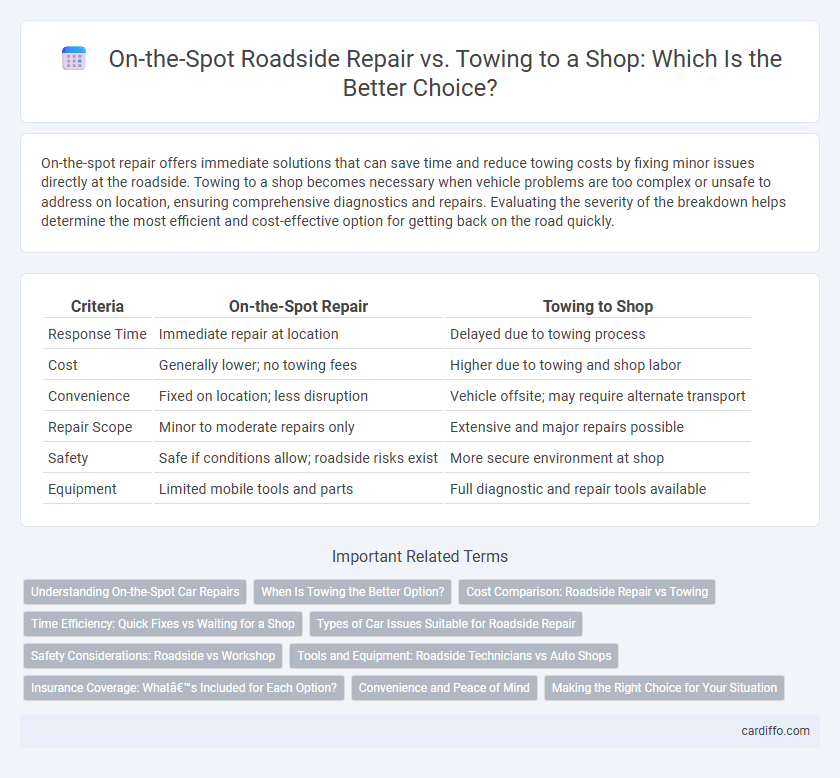On-the-spot repair offers immediate solutions that can save time and reduce towing costs by fixing minor issues directly at the roadside. Towing to a shop becomes necessary when vehicle problems are too complex or unsafe to address on location, ensuring comprehensive diagnostics and repairs. Evaluating the severity of the breakdown helps determine the most efficient and cost-effective option for getting back on the road quickly.
Table of Comparison
| Criteria | On-the-Spot Repair | Towing to Shop |
|---|---|---|
| Response Time | Immediate repair at location | Delayed due to towing process |
| Cost | Generally lower; no towing fees | Higher due to towing and shop labor |
| Convenience | Fixed on location; less disruption | Vehicle offsite; may require alternate transport |
| Repair Scope | Minor to moderate repairs only | Extensive and major repairs possible |
| Safety | Safe if conditions allow; roadside risks exist | More secure environment at shop |
| Equipment | Limited mobile tools and parts | Full diagnostic and repair tools available |
Understanding On-the-Spot Car Repairs
On-the-spot car repairs provide immediate solutions for roadside issues such as flat tires, dead batteries, and minor engine troubles, reducing downtime and eliminating the need for towing services. Equipped technicians utilize mobile diagnostic tools and essential repair equipment to restore vehicle functionality directly at the breakdown site. This approach enhances driver convenience and minimizes costs by avoiding tow fees and shop labor charges.
When Is Towing the Better Option?
Towing to a shop becomes the better option when the vehicle experiences severe mechanical failure, such as engine seizure or extensive transmission damage, making on-the-spot repairs impossible. Safety concerns arise if the car is stranded in a high-traffic or hazardous location, where immediate towing ensures protection for both the vehicle and its occupants. Furthermore, modern vehicles with complex electronic systems often require diagnostic equipment available only in professional repair facilities, reinforcing towing as the practical choice.
Cost Comparison: Roadside Repair vs Towing
On-the-spot repair typically costs between $50 and $150, offering a cost-effective solution that eliminates towing fees, which can range from $100 to $200 or more depending on distance. Towing to a shop incurs additional expenses such as labor charges, often $75 to $150 per hour, and potential shop diagnostics fees, increasing overall repair costs. Choosing roadside repair minimizes downtime and out-of-pocket expenses, especially for minor mechanical issues easily fixed on site.
Time Efficiency: Quick Fixes vs Waiting for a Shop
On-the-spot repair offers time efficiency by providing immediate solutions that can get vehicles back on the road within minutes, avoiding the delays associated with scheduling and transporting a car to a repair shop. Towing to a shop often involves longer wait times due to travel, shop workload, and repair complexity, which can extend downtime significantly. Quick fixes like tire changes or battery jumps reduce interruption, making on-the-spot repairs ideal for minor issues requiring rapid resolution.
Types of Car Issues Suitable for Roadside Repair
Minor car issues such as flat tires, dead batteries, and locked-out vehicles are ideal for on-the-spot roadside repair, enabling quick resolution without the need for towing. Mechanical problems like engine overheating, fuel delivery failures, or brake system malfunctions typically require towing to a specialized repair shop for comprehensive diagnostics and repairs. Efficient roadside assistance prioritizes immediate, simple fixes to minimize downtime and avoid costly tows whenever possible.
Safety Considerations: Roadside vs Workshop
On-the-spot repair minimizes the risk of driving a disabled vehicle, reducing exposure to traffic hazards and ensuring immediate safety for the driver and passengers. Towing to a workshop offers a controlled environment free from roadside dangers, allowing technicians to safely perform thorough diagnostics and repairs. Choosing between the two depends on the vehicle's condition, road location, and the urgency of restoring safe operation without compromising personal safety.
Tools and Equipment: Roadside Technicians vs Auto Shops
Roadside technicians rely on portable, compact tools such as battery testers, jump starters, and tire inflators to perform quick, on-the-spot repairs under limited conditions. Auto repair shops feature advanced diagnostic equipment, hydraulic lifts, and specialized machinery enabling comprehensive inspections and complex repairs. This difference in tools and equipment directly impacts the types of repairs that can be efficiently handled roadside versus those requiring towing to a fully equipped shop.
Insurance Coverage: What’s Included for Each Option?
Insurance coverage for on-the-spot repairs typically includes labor and minor parts replacement necessary to get the vehicle back on the road immediately, often with limits on the total reimbursable cost. Towing to a shop is generally covered under roadside assistance clauses, including transportation fees up to a specified distance, with repairs at the shop subject to standard auto insurance policies or extended warranties. Understanding the specific terms of your insurance policy is crucial to determine which costs are covered and any out-of-pocket expenses for either on-the-spot repair or towing services.
Convenience and Peace of Mind
On-the-spot repair offers unmatched convenience by addressing minor vehicle issues immediately at the roadside, minimizing downtime and stress. This service ensures peace of mind with expert technicians equipped to handle repairs promptly, reducing uncertainty during breakdowns. In contrast, towing to a shop may involve longer wait times and logistical challenges, making on-the-spot repair a preferred choice for efficient and reliable roadside assistance.
Making the Right Choice for Your Situation
Choosing on-the-spot roadside repair or towing to a shop depends on the severity of the vehicle issue and location safety. Minor problems like flat tires or battery jumps can be resolved quickly on-site, saving time and cost. Severe mechanical failures or unsafe environments demand professional towing to ensure proper diagnostics and repairs, preventing further damage and ensuring roadside safety.
On-the-Spot Repair vs Towing to Shop Infographic

 cardiffo.com
cardiffo.com